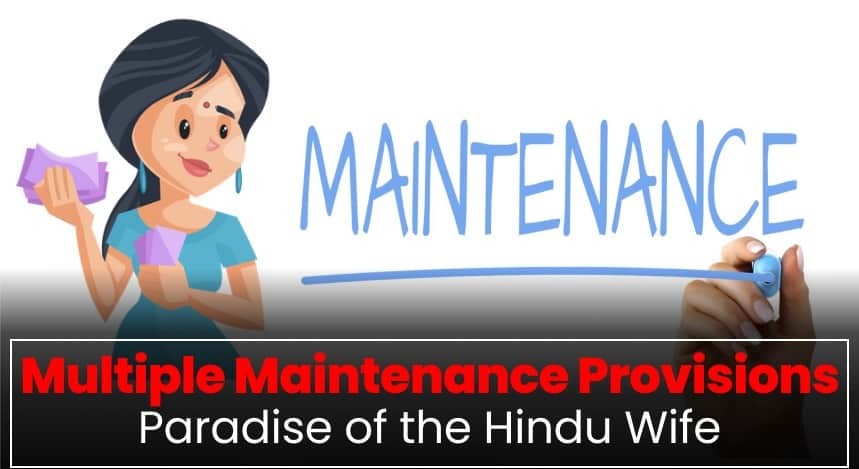
Multiple Maintenance Provisions : Paradise of the Hindu Wife
Recently, the Supreme Court through its division bench, comprising of Justice D. Y Chandrachud and Justice Indira Banerjee, dismissed a special leave petition under Article 136 of the Constitution of India in the matter of Shome Nikhil Danani v. Tanya Banon Danani and thereby held that mere passing of an order under Section 125 of the Code of Criminal Procedure, 1973 did not preclude the wife from seeking appropriate reliefs under the Protection of Women from Domestic Violence Act 2005. The abovementioned S.L.P was filed against a Delhi High Court order which had expressed the same view as above.
Justice Sanjeev Sachdeva of the Delhi High Court, while considering a revision petition, had observed that “the proceeding under the D.V Act and under section 125 Cr.P.C are independent of each other and have different scope, though there is an overlap. In so far as the overlap is concerned, law had catered for that eventuality and laid down that at the time of consideration of an application for grant of maintenance under DV Act, maintenance fixed under Section 125 Cr.P.C shall be taken into account. “
The Delhi High Court order and the pursuant Supreme Court order confirming it raises an inborn question, why are there more than one provision in the Indian law which give the right to maintenance to the wife against her husband. For the purpose of this research Article, I’m going to limit myself to the rights to maintenance of the Hindu wife and study the various provisions of maintenance under Hindu Personal Laws and comparatively analyze them against secular laws which ensure her this right.
For a Hindu wife, there are five provisions regarding grant of maintenance, they are either temporary or permanent in nature, they are:-
- Section 125 of the Cod of Criminal Procedure, 1973.
- Section 24 of the Hindu Marriage Act, 1955.
- Section 25 of the Hindu Marriage Act, 1955.
- Section 20 of the Protection of Women from Domestic Violence Act, 2005.
- Section 18 of the Hindu Adoption and Maintenance Act, 1956.
Section 125 of the Crpc is a Secular law; that is to say that any married women irrespective of her religion can ask her husband to maintain her. It is of no consequence if the wife is divorced or still married to her husband but it is obligatory that the marriage between the applicant and the Respondent was a valid marriage, the onus to prove the same lies on the wife. Both interim as well as permanent maintenance can be granted under this section, given the wife remains chaste and doesn’t remarry.
Section 24 of the H.M.A is an interim provision which can be awarded to both the wife as well as the husband against each other, during the proceedings under the act i.e. “pendente lite”. Section 25 of the H.M.A deals with permanent alimony and maintenance, again both the husband and the wife can seek relief under this provision but it can only be granted after the divorce or the judicial separation of the couple. Moreover, these two are the only provisions in the Hindu Personal laws which grant the maintenance/alimony to the spouses whose marriage has been declared as void; unlike section 125 where an order of maintenance passed in the favour of wife becomes null and void if the marriage of the applicant and respondent has been declared as void.
Section 20 of the Protection of Women against Domestic Violence Act, 2005 is a secular provision; the religion of the aggrieved wife is inconsequential, it is a compensatory provision which provides monetary relief to the aggrieved wife for the violent offenses committed against her. Although it is necessary that the wife must have a domestic relationship with the persons against whom she files a complaint under this section, at the time of filing of the complaint. Sub-section (1) clause (f) of the provision outrightly states that a claim under this section can be brought in addition to a grant of maintenance to the wife under section 125, the reason being that it is a compensatory relief and not a maintenance award as envisioned under S. 125 Cr.P.C.
Section 18 of the Hindu Adoption and Maintenance Act, 1956 gives Hindu wife a right to separate residence and maintenance by her husband during her lifetime until she remains chaste and does not remarry. The claim under this section can only be brought by a Hindu wife till she is legally married to her husband i.e. not divorced or judicially separated from her husband by an order of a competent court. Further, a Hindu wife from only a valid Hindu Marriage can claim maintenance under this provision; if the wife was awarded maintenance under this section and the husband gets the marriage annulled then the order of maintenance would stand vitiated.
Distinctiveness between Section 125 of Cr.P.C and Section 18 of H.A.M.A is hard to find, as in both the provisions the Hindu wife has the liberty to claim maintenance for herself, the maximum period for which such maintenance can be claimed is till her lifetime. Further, a Hindu wife from a void marriage cannot claim maintenance under both these provisions, the only difference being that a wife cannot claim maintenance under section 18 of H.A.M.A from her erstwhile husband after a decree of divorce by a court of competent jurisdiction, while she can do so under Section 125 of Cr.P.C. Therefore, there is a big overlap between these two specific provisions.
The courts have taken into account that there are overlapping of various maintenance provisions but have repeatedly stated that they have differential scopes, further the Supreme Court has stated at various junctures that there is no bar to a wife to claim maintenance under various provisions at once, but onus is on courts to consider the money already being paid by the husband to his wife and then pass an order under the claim before it. In the absence of any logical rule to calculate such consideration, the courts find themselves with extravagant discretion which is bound to be misused in at-least some of the cases, leaving innnocent men to pay much more than what equity desires.
Lastly, Section 18 of H.A.M.A is a specific provision for a Hindu wife while Section 125 is a general provision available to her. It is a settled principle of Law that “generalia specialibus non derogant” i.e. a specific law should prevail over a general law, as held by the apex court in “M/s. Sundaram Finance Limited & Another v. T. Thankam”.
Hence, a Hindu wife should only be permitted to claim maintenance from her husband from either Section 18 H.A.M.A or Section 125 Cr.P.C and not from both at the same time as that is a violation of natural rights of the Husband.
You may contact me for consultation or advice by visiting Contact Us
